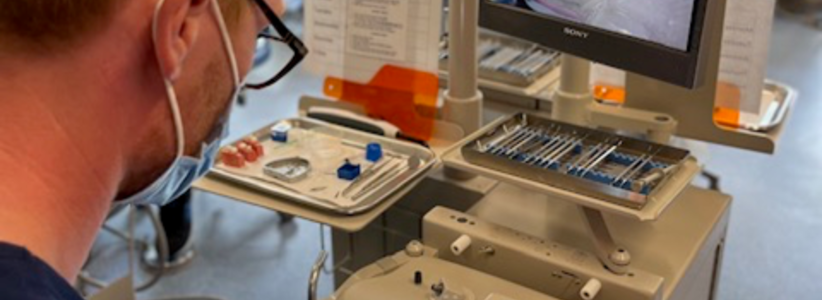Researchers encourage General Dental Practitioners and the public to support study for alternative treatments to severe toothache

20th February 2023
Dental research teams from the Universities of Dundee and Aberdeen lead a UK-wide research study (PIP study) to explore an alternative treatment option called Full Pulpotomy compared to the conventional option of Root Canal Treatment for patients experiencing severe toothache called irreversible pulpitis
The Pulpotomy for the management of Irreversible Pulpitis in mature teeth (PIP) Study is a pragmatic clinical trial, commissioned and funded by The National Institute for Health and Care Research, Health Technology Assessment (NIHR HTA) programme.
A collaborative team from the Universities of Dundee, Aberdeen, Glasgow, King's College London, Liverpool, Sheffield, and NHS Education for Scotland – supported by the NHS Research Scotland (NRS) Oral and Dental Group – are leading this high impact study to answer the important question: ‘What is the clinical and cost effectiveness of Full Pulpotomy and Root Canal Treatment for Irreversible Pulpitis in permanent premolar and molar adult teeth.’
Irreversible pulpitis where part of the nerve of the tooth is irreversibly damaged causing severe toothache is conventionally treated with extraction or root canal treatment. Root canal treatment, where the pulp (nerve and blood vessels) of the tooth is fully removed can be expensive, time consuming and technically demanding, with a high degree of patient anxiety attached to the treatment. The Full Pulpotomy technique is a treatment option that is not currently offered routinely in primary care dentistry. However, this technique removes only the damaged part of the pulp of the irreversibly inflamed tooth and may provide a more minimally invasive treatment option which could be quicker, cheaper and more acceptable to patients.
The PIP study is recruiting General Dental Practitioners from England and Scotland for its main study following a successful feasibility study last year, which showed that the Full Pulpotomy can be effectively provided in NHS general practice with good patient satisfaction following the treatment. General Dental Practitioners signing up to the study will receive training in the Full Pulpotomy technique using BiodentineTM, verified Continued Professional Development and remuneration for their contribution to the study.
The study aims to recruit 530 NHS patient participants from 50 general dental practices. Patient participants will be followed up for 1 year and the study will consider clinical, economic and patient centred outcomes.
Professor Jan Clarkson, Co-Chief Investigator said: “Research has already been conducted in children’s teeth that supports using pulpotomy instead of root canal treatment. However, there are gaps in our knowledge about using pulpotomy in adult’s teeth.”
Members of the public are also invited to help support the PIP Dental Research Studies by joining the Patient and Public Involvement (PPI) group, helping to ensure effective communication with patient participants, to make sure they are well informed and supported during the study. This also helps retention of patients throughout the study, leading to high quality research that we hope will make a positive difference to patient dental care in the future.
General Dental Practitioners who take part will receive a training package that includes face-to-face training in the Full Pulpotomy technique using BiodentineTMand remuneration of up to £2,176 from the research grant and up to £775 from Service Support Costs for their contribution to the study. You will be supported by the study team at every stage, so no prior research experience is necessary.
General information about the study, and how to get involved, can be found at the study website.
If you have NHS patients and would like to join the trial or hear more about it, please email the study team or fill out the Site Initiation Questionnaire.

